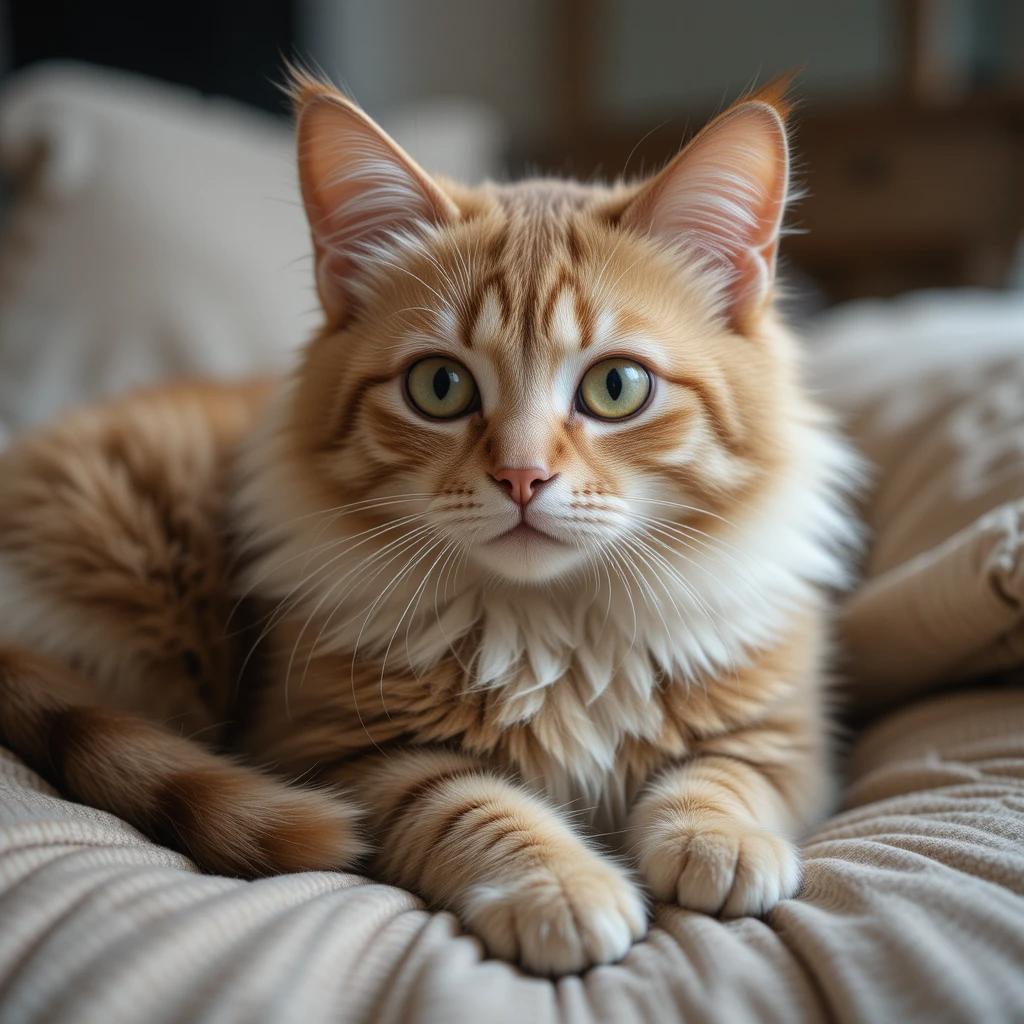Introduction
As pet owners, one of the most important questions we often ask is, how long do our feline companions live? Understanding a cat’s lifespan helps us provide the best care throughout their life. The typical lifespan of a cat varies, but with the right care, many cats can live into their teens or even into their early twenties. This knowledge allows pet parents to be proactive, ensuring that cats receive the proper nutrition, care, and attention at each stage of life.
Cats age differently, and how we respond to their changing needs can significantly impact their overall health. A 1-year-old kitten is vastly different from a 10-year-old senior cat, and how we treat these stages can help them live longer, healthier lives. Lifespan is not just about the number of years but the quality of life during those years.
Factors That Affect a Cat’s Lifespan
The lifespan of a cat is influenced by several factors, ranging from genetics to lifestyle choices. While it’s true that some cats naturally live longer than others, their quality of life often depends on the attention and care they receive. Here are the key contributors to how long your cat may live.
Genetics and Breed-Specific Lifespan Trends
Genetics plays a significant role in determining a cat’s potential lifespan. Certain breeds are known for their longevity, such as the Siamese and Burmese, which can live into their late teens or early twenties. Conversely, some breeds, like the Persian, may have shorter lifespans due to breed-specific health concerns. Understanding your cat’s breed can help predict potential health issues and prepare for them in advance.
Genetics not only affects lifespan but also the likelihood of developing certain diseases or conditions. For example, some cats inherit a predisposition to kidney disease or heart problems. Being aware of these genetic risks helps you make informed decisions regarding care and preventive measures.
The Role of Diet and Nutrition in Longevity
Diet is one of the most important factors influencing how long a cat lives. A high-quality diet that meets all of your cat’s nutritional needs is essential for maintaining health throughout their life. A balanced diet rich in proteins, fats, and essential vitamins can support longevity by promoting healthy organ function, strong bones, and a shiny coat.
Cats also benefit from wet food, which provides added moisture and can prevent kidney problems later in life. Cats that eat poorly, or that consume an unbalanced diet, may develop obesity or other health complications that shorten their lifespan. Avoid feeding your cat too many treats or low-quality, processed foods, as this can lead to weight gain, diabetes, and other chronic conditions.
How a Cat’s Environment Impacts Its Health and Lifespan
A cat’s environment has a profound effect on its health. Cats that are kept indoors generally live longer than outdoor cats due to a reduction in risk factors such as disease, predators, and accidents. A safe, stimulating indoor environment reduces stress and keeps your cat out of harm’s way.
However, providing an enriching environment indoors is also vital. Cats need mental stimulation, scratching posts, and cozy hiding spots to thrive. Ensuring your cat has access to a variety of toys, cat trees, and climbing spaces can help reduce boredom and encourage healthy exercise. This stimulation contributes to mental health, which is essential for a long and happy life.
Veterinary Care and Preventive Health Measures
Regular visits to the vet are critical in detecting potential health issues before they become serious problems. Preventive care such as vaccinations, flea treatments, and parasite control programs can protect your cat from harmful diseases and infections. Regular checkups also allow your vet to monitor your cat’s health and catch any signs of illness early on.
One of the most important aspects of veterinary care is dental health. Many cats suffer from periodontal disease, which can lead to serious complications if untreated. Regular dental checkups and cleaning can improve your cat’s overall well-being and extend their life.
How to Keep Your Cat Healthy for Longer
Maintaining your cat’s health requires more than just feeding them and taking them to the vet. There are several proactive steps you can take to promote longevity and reduce the risk of diseases. The following are some essential tips for keeping your cat healthy for a long, fulfilling life.
The Importance of Regular Veterinary Check-ups
Routine check-ups are necessary to monitor your cat’s health and catch early signs of issues such as dental disease, arthritis, or kidney problems. A trusted veterinarian can advise you on vaccinations, treatments, and diet to ensure your cat stays healthy well into its senior years.
The Role of Vaccinations and Parasite Control
Vaccinations help protect against dangerous diseases such as feline leukemia and feline immunodeficiency virus. Parasite control, including flea, tick, and worm treatments, is also essential for keeping your cat healthy. Untreated parasites can lead to serious health problems, so staying on top of parasite prevention is crucial.
Diet Recommendations for a Long, Healthy Life
High-quality food is the cornerstone of longevity. Providing a diet that is appropriate for your cat’s age, size, and health status ensures they get the nutrients they need. A mix of wet and dry food can promote hydration and support overall health. Remember to monitor portion sizes to avoid obesity, which is a risk factor for many health issues.
Exercise and Mental Stimulation for Aging Cats
Exercise isn’t just for kittens. Even senior cats need exercise to maintain a healthy weight and muscle tone. Providing opportunities for exercise through interactive play can help prevent obesity and promote good cardiovascular health. Mental stimulation, such as puzzle feeders and new toys, also keeps your cat’s brain sharp as they age.
Managing Common Health Issues to Extend Your Cat’s Life
As cats age, they are prone to certain health problems. Managing these issues proactively can help your cat live a longer, more comfortable life.
Preventing Obesity and Managing Weight
Obesity is a growing problem for cats and can lead to numerous health complications such as diabetes, joint issues, and heart disease. Keep an eye on your cat’s weight and provide portion-controlled meals. Encourage exercise and avoid overfeeding to keep your cat at a healthy weight.
Dental Health and Its Impact on Lifespan
Dental issues are common in cats, and untreated dental disease can lead to systemic infections that affect the heart, kidneys, and liver. Regular dental checkups and brushing your cat’s teeth can prevent these issues and improve their quality of life.
Recognizing Early Signs of Illness and Seeking Treatment
Being attuned to your cat’s behavior is essential for spotting early signs of illness. Watch for changes in appetite, litter box habits, and behavior. If you notice lethargy, sudden weight loss, or vomiting, it’s essential to consult with your vet right away. Early intervention can make a significant difference in your cat’s health and longevity.
Coping with Aging: Joint Health and Mobility
As cats age, joint pain and arthritis become common. Senior cats may become less active or struggle to jump and climb. Providing orthopedic beds, joint supplements, and managing their weight can alleviate some of these issues and keep your cat comfortable.
Understanding Your Cat’s Aging Process
Cats age at different rates depending on their breed and size. Smaller cats tend to live longer than larger breeds. As cats age, they require special attention to their diet, exercise, and overall health. Recognizing the aging process helps you adapt your care routine to meet your cat’s needs.
How Cats Age: What Happens as They Get Older
Cats experience physical and mental changes as they age. Their metabolism slows down, and their senses may diminish. Their behavior might also change, with some cats becoming more affectionate or withdrawn. Knowing what to expect helps you respond to these changes with the care and attention they need.
Senior Cat Care: Adjusting Diet and Environment for Older Cats
As your cat enters its senior years, it’s essential to adjust its diet to support aging joints, kidneys, and overall health. Many senior cat foods are formulated to provide easier-to-digest ingredients and joint supplements. Additionally, make adjustments to their environment by providing ramps or steps to help them access high places.
Monitoring Behavioral Changes and Providing Comfort
Changes in behavior, such as increased vocalization, restlessness, or difficulty in grooming, may indicate an underlying health problem. Monitoring these changes and providing extra comfort through cozy spots and soft bedding will help them feel secure and loved during their senior years.
The Emotional and Social Needs of Senior Cats
As cats age, their emotional needs may change. Senior cats may require more attention, reassurance, and companionship. Some may also become more anxious or exhibit signs of cognitive dysfunction. Ensuring your cat feels safe, comfortable, and loved is vital for their emotional well-being.
Enhancing Your Cat’s Quality of Life
Improving your cat’s quality of life is just as important as maintaining their health. Creating an enriching environment and offering plenty of mental stimulation helps prevent boredom and keeps your cat engaged with the world around them.
Creating a Safe and Enriching Environment
An enriching environment is essential for your cat’s mental and physical well-being. Offer toys, scratching posts, and places to climb. Providing a safe, quiet retreat where they can relax will also help your cat feel secure and comfortable.
Stress Reduction Techniques for Cats
Stress can negatively impact your cat’s health and longevity. Minimize stress by maintaining a consistent routine, reducing noise levels, and providing a calm space for your cat to retreat to when needed. Feliway diffusers can also help reduce anxiety and create a peaceful atmosphere.
The Importance of Companionship and Mental Stimulation
Cats need companionship, especially as they grow older. Spending quality time with your cat through play, petting, or simply sitting together can greatly enhance their emotional health. Providing mental stimulation through puzzles and games keeps their minds sharp and active.
How to Improve Your Cat’s Comfort and Well-being as It Ages
To improve your cat’s comfort as it ages, provide soft bedding, orthopedic cushions, and low-entry litter boxes. Managing pain through medication or supplements can also enhance their mobility and overall quality of life.
Conclusion
The key to a longer, healthier life for your cat lies in proactive care, regular check-ups, and maintaining a nurturing environment. Early detection of health problems, good nutrition, and consistent preventive care are crucial. Every day spent with your cat is precious, and by fostering a loving, healthy environment, you can ensure they live a long, happy life.

